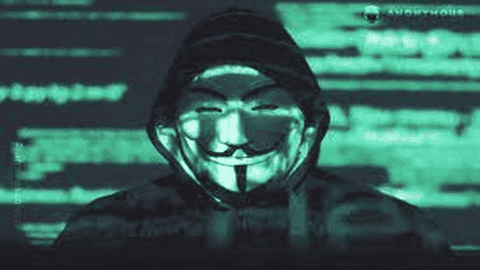The hacker group Anonymous declared this Thursday, 24, a “cyberwar” against Russia, after the invasion of Ukrainian territory overnight. In a message posted on Twitter, the group said it had taken down government websites and the state television network RT News. Anonymous warned that the private sector could also be affected.
Anonymous declares “cyberwar” against Russia
Despite the use of the expression, Professor of Political Science Lucas Rezende, from the Federal University of Minas Gerais (UFMG), Brazil, does not believe that the concept of “war” fits here. The cyber conflict even exploits the opponent’s vulnerabilities in the virtual sphere and can cause great harm. It can bring interruption, degradation, tampering, or destruction of information or computer systems. However, the concept of war goes deeper, according to the professor.
“War is an act of force to subjugate the opponent to his will. Cyber attacks are political tools that aim to cause delays, damage, difficulties, even demoralize the opponent. It is very rare that someone dies because of operations in cyberspace. So, this differs a lot from war. War is the use of force, weaponry. Tt is killing someone or convincing someone to do something through the use of force. And the cyber attack is a political tool”, he evaluates.
Even with Anonymous declaring “war” against Russia and causing damage to state websites, Rezende does not believe that the hacker group’s actions interfere with the country’s strategy. The professor considers that it will only cause some moral embarrassment to the government of Vladimir Putin. However, it will bring no harm to the Armed Forces.
On the other hand, Creomar de Souza, founder of the consultancy Dharma, which specializes in political risk analysis, notes that “cyber warfare” can affect the networked communication of military equipment and the Russian supply chain. This, indeed, could impact Putin’s army in practice.
“An important element of 21st-century warfare is that you also have the ability to disrupt the flow of your opponent’s data. You can invade health network computing systems, public safety, and defense systems,” he points out.
Although he does not see the impact of the Anonymous attack on Russia, Professor Lucas Rezende considers it possible that the next wars will happen in cyberspace. Not just that way, but having technology as an ally in confrontations.
In fact, US and Europe sanctions against Russia involve online services. Big names like Apple, Facebook, Twitter, and other online services are banning Russia. The NVIDIA services may have been attacked recently, and some rumors suggest that has been retaliation from Russia. The Prime Minister of Ukraine is appealing to Apple’s CEO Tim Cook to ban all Russian users from App Store and limit iPhone use. He believes that affecting the life of Russian civilians, will put them against the government.
